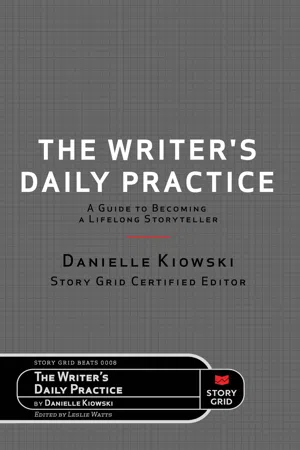
The Writer's Daily Practice
A Guide to Becoming a Lifelong Storyteller
- English
- ePUB (mobile friendly)
- Available on iOS & Android
About this book
To write a story that captivates readers and stands the test of time, you need a daily practice and professional tools. In this guide, fantasy author and editor Danielle Kiowski rolls out an elegant blueprint for building your practice using Story Grid tools.
Like all writers, you struggle to defeat Resistance and devote proper time and attention to craft. You want to get words on the page, and above all, you want your stories to work. Kiowski demonstrates how the Story Grid Rule of 530 can help you establish simple, transformative habits to reach those goals.
What's the Rule of 530? Write 500 words a day and study masterworks of story craft for 30 minutes per day.
A daily writing and story analysis practice will level up your skills by blending four types of knowledge to help you understand what makes a story great and how to infuse that knowledge into your own stories. You'll learn concepts based on Story Grid's methodology, put those concepts into practice, test your understanding, and finally-through group study-you'll develop new, shared insights.
Beautiful stories don't happen overnight.
Focus on the process. Use the Rule of 530. And find joy in becoming a lifelong storyteller.
Frequently asked questions
- Essential is ideal for learners and professionals who enjoy exploring a wide range of subjects. Access the Essential Library with 800,000+ trusted titles and best-sellers across business, personal growth, and the humanities. Includes unlimited reading time and Standard Read Aloud voice.
- Complete: Perfect for advanced learners and researchers needing full, unrestricted access. Unlock 1.4M+ books across hundreds of subjects, including academic and specialized titles. The Complete Plan also includes advanced features like Premium Read Aloud and Research Assistant.
Please note we cannot support devices running on iOS 13 and Android 7 or earlier. Learn more about using the app.
Information
THE VALUE OF DAILY PRACTICE
THE 500
FOCUS ON QUANTITY
Table of contents
- Cover
- THE TRUTH IS
- WELCOME TO THE STORY GRID UNIVERSE
- Title Page
- Copyright
- Dedication
- ABOUT THIS BOOK
- 1. THE VALUE OF DAILY PRACTICE
- 2. THE 500
- 3. THE 30
- 4. BUILDING A WRITING PRACTICE
- 5. FINDING COMMUNITY
- CONCLUSION
- ABOUT THE AUTHOR
- ABOUT THE EDITOR